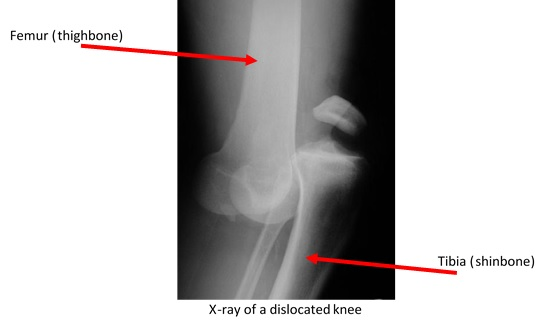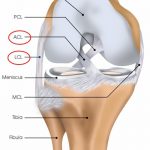
Knee dislocations in athletes like Bears tight end Zach Miller’s typically require complex, reconstructive surgery
If you didn’t see the video replay or a photo, you’ve probably heard people discussing the knee injury Chicago Bears tight end Zach Miller sustained in the game against the New Orleans Saints. Miller was running a passing route and as he planted his left foot just outside the end zone his knee dislocated.
Knee dislocations are rare and most often occur in high-energy motor vehicle accidents. They also happen in sports that require pivoting, jumping, cutting or changing direction such as basketball, gymnastics, soccer, volleyball, or in contact sports such as football and rugby.
Knee dislocations occur when multiple major ligaments are torn—usually three of the four. Typically, it involves both cruciate ligaments (anterior cruciate ligament [ACL] and posterior cruciate ligament [PCL], and one collateral ligament [medial collateral ligament (MCL) and/or the posterolateral ligament complex [PLC]). The ligaments help maintain the normal relationship between the femur (thighbone) and the tibia (shinbone) and allow motion until certain extremes. Injuries that produce forces that move the knee beyond these extremes can result in ligament injury.
If untreated, a knee dislocation usually results in the knee persistently giving way (instability) often with even daily activities, let alone athletic activities. Injuries to the arteries or nerves, such as Zach Miller’s injury that involved the popliteal artery behind his knee, can have a higher risk for a poor outcome. In the case of a vascular injury, emergent surgery is required to return blood circulation to the leg. Some athletes can return to sports participation after this injury, but recovery is long and challenging.
Fortunately for Miller, the team’s medical staff attended to him immediately and saved his leg. Because the staff reportedly could not find a pulse in Miller’s leg, he underwent immediate vascular testing which identified the popliteal artery injury. This required emergent surgery to repair the artery and re-establish blood flow to his leg. Miller will undergo additional surgery later to repair and reconstruct (replace) the torn ligaments to restore stability to his knee.
Following surgery, physical therapy is necessary to regain knee range of motion, muscle control and strength. It can take six months to a year for full recovery.
Although Zach Miller has a long recovery ahead, the upside is that he received timely and expert orthopaedic evaluation and treatment—the key to treating any injury. I wish him all the best for a successful outcome and a return to the Bears lineup.
Dr. Steven Chudik, with the Shoulder, Knee and Sports Medicine Clinic, is a noted arthroscopic orthopaedic surgeon and sports medicine specialist who has been treating athletes and weekend warriors of all ages and abilities for more than 15 years. He also is the team physician for several area high schools and sports clubs. Dr. Chudik has convenient clinic hours five days a week in Westmont or Western Springs, Ill., and is affiliated with an immediate care clinic for urgent care and X-rays on Saturdays between 9 a.m. and 1 p.m. No appointment is necessary, but you do need to inform the receptionist you are a patient of Dr. Chudik’s when you register.
To schedule a clinic appointment with Dr. Chudik, you can call 630-324-0402, or go online to his website and use the scheduling feature at stevenchudikmd.com/schedule-online/.








